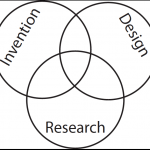 Projects in an engineering curriculum can be divided into 3 types, depending on their emphasis: research, invention, and design.Each of these project types emphasizes a different set of skills and disciplines. Any rich project will involve a combination of these 3 categories to varying degrees, but there is usually one dominant project theme that often classifies it as one or the other. The Research-Invention-Design (RID) categories could then best be summarized by the Venn diagram (left).
Projects in an engineering curriculum can be divided into 3 types, depending on their emphasis: research, invention, and design.Each of these project types emphasizes a different set of skills and disciplines. Any rich project will involve a combination of these 3 categories to varying degrees, but there is usually one dominant project theme that often classifies it as one or the other. The Research-Invention-Design (RID) categories could then best be summarized by the Venn diagram (left).
RID projects differ in their goals, primary document production, primary mode of problem solving, and requisite level of originality, to name just a few attributes. These key differences are summarized in the table below.
|
Research |
Invention |
Design |
|
|
Primary Document |
journal article/ conference paper |
invention disclosure/patent |
technical report/ specification |
|
Key Outcome |
new, codified, reproducible knowledge |
novel, non-obvious method or apparatus |
reproducible prototype |
|
Primary Mode of Problem Solving |
Scientific Method |
Induction/ Invention |
Deduction/Down- selection |
|
Required for Accreditation |
No |
No |
Yes |
|
Implementation Required |
No |
No |
Yes |
|
Creativity Required |
Yes |
Yes |
Yes |
|
Originality Required |
Yes |
Yes |
No |
|
Example Georgia Tech Program |
ORS |
CREATE-X |
Senior Design ECE 4012 |
It should be noted that accrediting organizations only require undergraduate engineers to be trained in design, as originality is often viewed as the purview of advanced degrees. However, it is beneficial for undergraduate engineering students to have exposure to all aspects of RID, as the accrued skills and experiences add significant value to students otherwise exposed to only lecture-based courses. All RID projects expose students to teamwork, public speaking, persuasive writing, problem-solving, and project management in ways that lecture-based courses cannot.